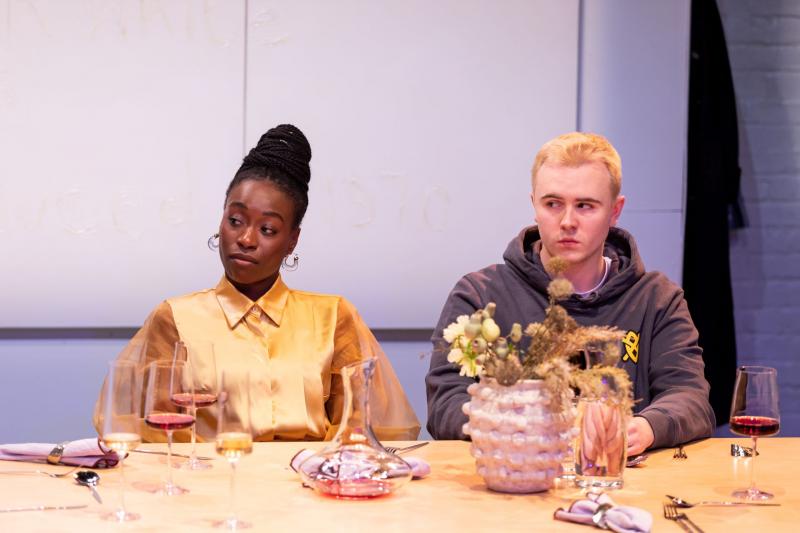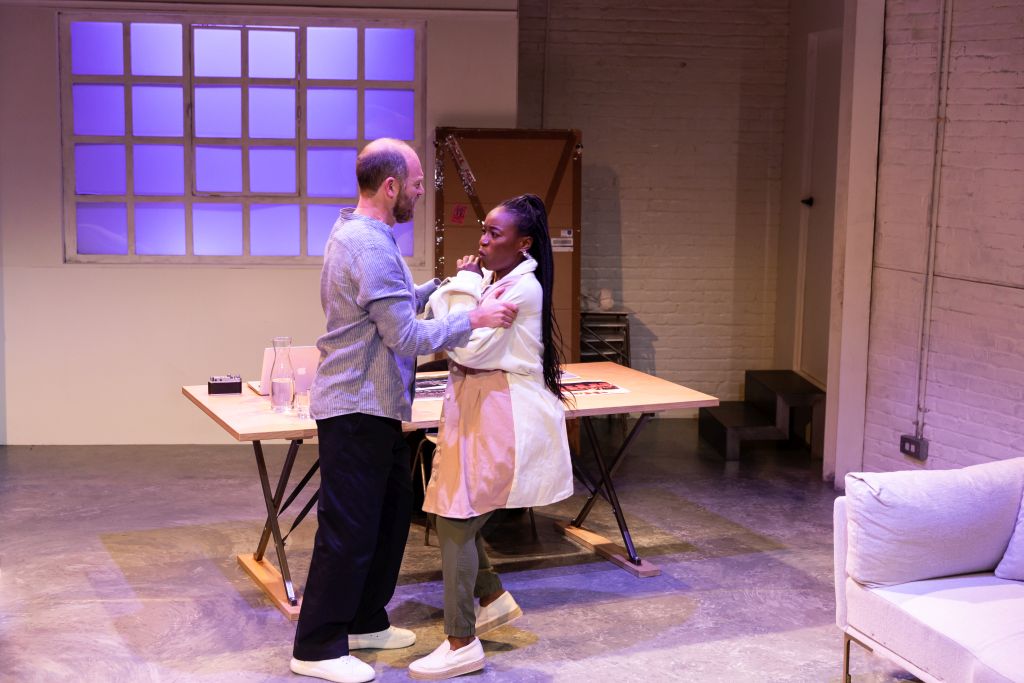The White Card, Soho Theatre review - expelling the audience from its comfort zone | reviews, news & interviews
The White Card, Soho Theatre review - expelling the audience from its comfort zone
The White Card, Soho Theatre review - expelling the audience from its comfort zone
Art and race intersect to provocative effect

We’re in New York City, in an upscale loft apartment, with that absence of stuff that speaks of a power to acquire anything. There are paintings on the walls, but we see only their descriptions: we learn that the owner (curator, in his word) really only sees the descriptions, too, and that the aesthetic and artistic elements barely register.
Claudia Rankine’s play premiered in 2018 and feels, superficially at least, very much of its time and place. There’s much talk of Trump, of the legacy of slavery, of police murders. Delve a little deeper – and this play insists that its audience does so – and more general concerns emerge, questions that probably didn’t need the mirrors brought out during a scene change to persuade a largely white London public to see itself reflected in the themes presented.
 Directed at a terrific pace by Natalie Ibu, the two central characters circle each other with a wary respect but also a bubbling hostility. Charles and Charlotte – no coincidence in those names – appear to want the same thing: to bring the lived experience of black oppression into the light through art. But their histories, ideologies and methods are so at variance as to be irreconcilable (well, almost but not quite, as it transpires).
Directed at a terrific pace by Natalie Ibu, the two central characters circle each other with a wary respect but also a bubbling hostility. Charles and Charlotte – no coincidence in those names – appear to want the same thing: to bring the lived experience of black oppression into the light through art. But their histories, ideologies and methods are so at variance as to be irreconcilable (well, almost but not quite, as it transpires).
Christine Gomes (with Matthew Pidgeon, above right) gives Charlotte a steely confidence, a commitment to her art and to her framing of Black America’s violent suppression as a direct product of white America’s unwillingness to confront its own reality, subconsciously hiding behind learned behaviours so internalised that they are accepted as inevitable. In the year that passes between the first act and the second, she turns her camera from photographing the consequences of white America’s grip over Black America to its causes, Charles now no longer a third party in her work.
Matthew Pidgeon is all liberal guilt and blundering condescension with a side order of victimhood as Charles, a man who cannot help but see life as transactional, for all of his white saviour obsession. In business, he builds private prisons benefitting hugely from the incarceration-heavy locale that is 21st century USA - but he also builds hospitals. He is abhorred, genuinely traumatised, by the police violence meted out to their Black victims but funds artists to portray it. He has been implored by his wife to help his elder son avoid prison, but at the same time feels that drug addicts must get what’s coming to them.
Minor characters are less complex. Kate Copeland plays Virginia, Charles’ fragile, embittered wife, as a cheerleader against racial inequality whose understanding of its impact and causes is barely as deep as the paint on the canvases she resents filling her walls. CJ Coleman lends a resentful rich kid wokeness to their younger son, Alex, the kind of Ivy Leaguer for whom the Dead Kennedys wrote “Holiday in Cambodia” 42 years ago. Nick Blakeley does what he can with his caricature of a dealer who will say anything to close the sale, an exemplar of big business’s relentless cynicism.
The White Card presents much to chew on without ever losing sight of the drama that drives its central relationship. Few will be more comfortable with their thoughts on the way out as they were on the way in and a difficult question hangs heavy in the air for (let's guess) 90% of its audience. What are you going to do about it?
rating
Explore topics
Share this article
The future of Arts Journalism
You can stop theartsdesk.com closing!
We urgently need financing to survive. Our fundraising drive has thus far raised £49,000 but we need to reach £100,000 or we will be forced to close. Please contribute here: https://gofund.me/c3f6033d
And if you can forward this information to anyone who might assist, we’d be grateful.

Subscribe to theartsdesk.com
Thank you for continuing to read our work on theartsdesk.com. For unlimited access to every article in its entirety, including our archive of more than 15,000 pieces, we're asking for £5 per month or £40 per year. We feel it's a very good deal, and hope you do too.
To take a subscription now simply click here.
And if you're looking for that extra gift for a friend or family member, why not treat them to a theartsdesk.com gift subscription?
more Theatre
 Othello, Theatre Royal, Haymarket review - a surprising mix of stateliness and ironic humour
David Harewood and Toby Jones at odds
Othello, Theatre Royal, Haymarket review - a surprising mix of stateliness and ironic humour
David Harewood and Toby Jones at odds
 Macbeth, RSC, Stratford review - Glaswegian gangs and ghoulies prove gripping
Sam Heughan's Macbeth cannot quite find a home in a mobster pub
Macbeth, RSC, Stratford review - Glaswegian gangs and ghoulies prove gripping
Sam Heughan's Macbeth cannot quite find a home in a mobster pub
 The Line of Beauty, Almeida Theatre review - the 80s revisited in theatrically ravishing form
Alan Hollinghurst novel is cunningly filleted, very finely acted
The Line of Beauty, Almeida Theatre review - the 80s revisited in theatrically ravishing form
Alan Hollinghurst novel is cunningly filleted, very finely acted
 Wendy & Peter Pan, Barbican Theatre review - mixed bag of panto and comic play, turned up to 11
The RSC adaptation is aimed at children, though all will thrill to its spectacle
Wendy & Peter Pan, Barbican Theatre review - mixed bag of panto and comic play, turned up to 11
The RSC adaptation is aimed at children, though all will thrill to its spectacle
 Hedda, Orange Tree Theatre review - a monument reimagined, perhaps even improved
Scandinavian masterpiece transplanted into a London reeling from the ravages of war
Hedda, Orange Tree Theatre review - a monument reimagined, perhaps even improved
Scandinavian masterpiece transplanted into a London reeling from the ravages of war
 The Assembled Parties, Hampstead review - a rarity, a well-made play delivered straight
Witty but poignant tribute to the strength of family ties as all around disintegrates
The Assembled Parties, Hampstead review - a rarity, a well-made play delivered straight
Witty but poignant tribute to the strength of family ties as all around disintegrates
 Mary Page Marlowe, Old Vic review - a starry portrait of a splintered life
Tracy Letts's Off Broadway play makes a shimmeringly powerful London debut
Mary Page Marlowe, Old Vic review - a starry portrait of a splintered life
Tracy Letts's Off Broadway play makes a shimmeringly powerful London debut
 Little Brother, Soho Theatre review - light, bright but emotionally true
This Verity Bargate Award-winning dramedy is entertaining as well as thought provoking
Little Brother, Soho Theatre review - light, bright but emotionally true
This Verity Bargate Award-winning dramedy is entertaining as well as thought provoking
 The Unbelievers, Royal Court Theatre - grimly compelling, powerfully performed
Nick Payne's new play is amongst his best
The Unbelievers, Royal Court Theatre - grimly compelling, powerfully performed
Nick Payne's new play is amongst his best
 The Maids, Donmar Warehouse review - vibrant cast lost in a spectacular-looking fever dream
Kip Williams revises Genet, with little gained in the update except eye-popping visuals
The Maids, Donmar Warehouse review - vibrant cast lost in a spectacular-looking fever dream
Kip Williams revises Genet, with little gained in the update except eye-popping visuals
 Ragdoll, Jermyn Street Theatre review - compelling and emotionally truthful
Katherine Moar returns with a Patty Hearst-inspired follow up to her debut hit 'Farm Hall'
Ragdoll, Jermyn Street Theatre review - compelling and emotionally truthful
Katherine Moar returns with a Patty Hearst-inspired follow up to her debut hit 'Farm Hall'
 Troilus and Cressida, Globe Theatre review - a 'problem play' with added problems
Raucous and carnivalesque, but also ugly and incomprehensible
Troilus and Cressida, Globe Theatre review - a 'problem play' with added problems
Raucous and carnivalesque, but also ugly and incomprehensible

Add comment